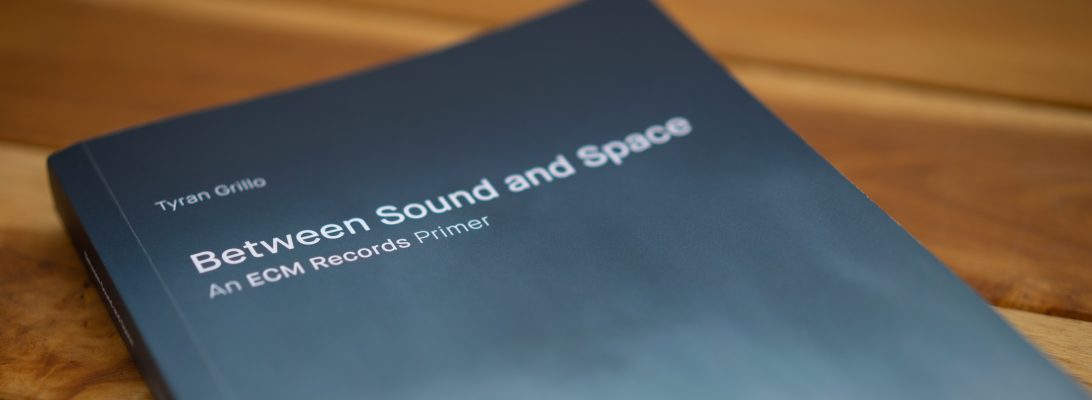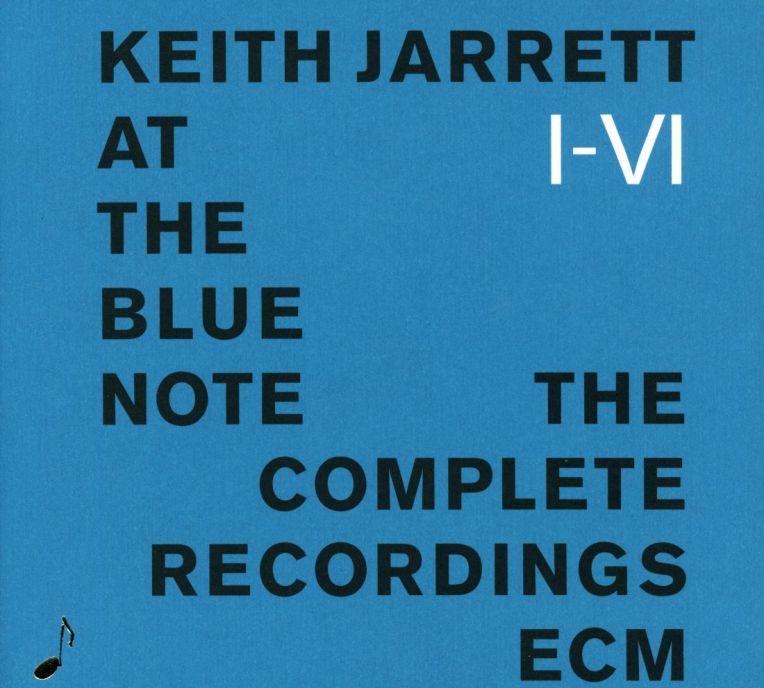Keith Jarrett Trio
At The Blue Note – The Complete Recordings
Keith Jarrett piano
Gary Peacock bass
Jack DeJohnette drums
Recorded June 3–5, 1994, New York
Engineer: Jan Erik Kongshaug
Produced by Manfred Eicher
When Keith Jarrett opens Dave Brubeck’s “In Your Own Sweet Way,” the first off this monumental document of a weekend’s Blue Note concerts in June of 1994, we feel right at home. Sharing the stage with Gary Peacock and Jack DeJohnette, he epitomizes balance of fire and grace in the famed jazz club’s intimate and hallowed confines. But there is, of course, nothing confining about the 7-hour journey on which the listener has just embarked, for as Peacock spreads his fingers wide, fanning the flames over DeJohnette’s never-hackneyed rat-a-tat-tat, we understand that this is something more than music. It’s art, pure and simple.
So begins the first of three glorious nights of (mostly) standards from the trio that rewrote them all. What follows is a veritable train of the tried and true, which lets off the Gershwins at one station with “How Long Has This Been Going On,” Charlie Parker at another (“Now’s The Time”), and J. J. Johnson at still another (“Lament”). Peacock’s improvisational arc is their running spine, binding page after page of archival paper with insoluble glue. Jarrett manages to float throughout the livelier locks of “While We’re Young,” “Oleo,” and “If I Were A Bell,” the latter of which requires a pair of binoculars to spot DeJohnette, so high does he soar. The second Friday set also proves fertile ballad ground, tugging at the heartstrings “In The Wee Small Hours Of The Morning.” Here Peacock eases in almost unawares—a gradation of sunset from pink to orange—and turns drums into whispers. “Things Ain’t What They Used To Be” is another highlight, closing out the night with a gospel edge.
“Autumn Leaves,” which for my money no one plays better, kicks off Saturday’s tour de force at the astronomical length of nearly 27 minutes. But make no mistake: not a single note is wasted. Between Peacock’s beautifully ascending lines and Jarrett’s open O of ecstatic communication with the gods of improvisation, to say nothing of the fine swinging of the sticks from DeJohnette, there is always something to admire with each new listen. “Days of Wine and Roses” spreads one royal jazz flush across the poker table, giving us some of the set’s most unified moments, while a likeminded rendition of “When I Fall in Love” underscores Peacock, who is every bit as deft as Jarrett at unpacking the motives at hand for all they’re worth. “How Deep Is The Ocean” is a perfect example of Jarrett’s skills as an introducer, bringing us as he does into the atmosphere of the piece before the vamp rears its familiar head. Fresher moments abound in “I’ll Close My Eyes.” A crisp joint that snaps like a snow pea, its affirming energies feed Jarrett’s most phenomenal solo of the entire package. Spinning his chromatic staircases as if he were a lighthouse builder in a parallel night, he adds flesh to every bone. As Friday ended in Pentacost, so Saturday ends in the blues with “Things Ain’t What They Used To Be.”
Which leads us into the dynamic visions of Sunday’s closing sets. The first takes the smooth (“My Romance”) with the tempestuous (“La Valse Bleue”), the flustered (“You’d Be So Nice To Come Home To”) with the thrilling (“Straight, No Chaser”). The second adopts a more meditative approach, melting in Jarrett’s own “Desert Sun.” One of a smattering of originals, it unfolds like a solo concert piece, made all the richer for the presence of his incomparable sidemen. Like “Partners” (appearing twice on the album) and “Bop-Be,” it is a standalone story, a new chapter in a book that may never be finished. “No Lonely Nights” is another personal trip and finds its composer pouring on the starlight like syrup over pancakes. The remaining half of his tunes grow out of shorter standards, turning, for example, “On Green Dolphin Street” into a 21-minute jam with the addition of “Joy Ride.” So, too, with “You Don’t Know What Love Is” (augmented by Jarrett’s “Muezzin”) and “I Fall In Love Too Easily,” which submits to “The Fire Within.” And where else could such sustained brilliance come from?
Just when you think you’ve picked a favorite guide out of this trio for these sentimental journeys, another swoops in to take his place. In spite of their seemingly unstoppable flow, they always know when to take pause, to let the air breathe with the heads and tails of something new. And while I’d never recommend limiting oneself to a single recording by this groundbreaking group, for deep-end swimmers you can’t go wrong with this dive. As a live document alone, it will stand the test of time. The only downside is that you may feel sad at not having been there when all of this went down. Thankfully, through this treasure of a recording, we can trick ourselves into thinking that we were. The only standards worth sharing, says Jarrett in his liner notes, are the highest ones, and at the Blue Note you’ll find nothing but. This is where it’s at.
<< Gateway: In The Moment (ECM 1574)
>> Heinz Reber: MA – Two Songs (ECM 1581 NS)



A brilliant review of,in my opinion,of one of thee greatest jazz recordings of all time….you capture most articulately,the shining exhuberance of the Trio…with all its inherent joys…and express the riches within and the unfold treasures that captivate and enrapture the listener….many thanks
I’m with you 100% on the wonders of this recording and am so happy I was able to evoke at least something of what it feels like. Let’s hope those who haven’t yet taken this most worthwhile plunge will close their eyes and jump! Many thanks in return.